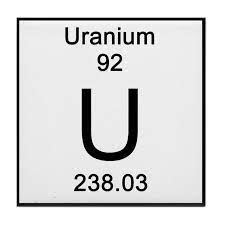
In 1939, Nobel prize winner of physics Albert Einstein signed a letter written in conjunction with Hungarian physicist Leo Szilard, which was then sent to the President of the United States Franklin D. Roosevelt, in which he noted the importance of uranium, and warned of the possibility that Nazi Germany might develop a nuclear bomb. In the letter, countries where uranium ore was found in abundance were cited, among which was then Belgian Congo.
It is no secret that the uranium used in the bombs that were dropped on Hiroshima and Nagasaki came from the Democratic Republic of Congo, then Belgian Congo.
The document became known as the “Einsten letter” which marked the beginning of the atomic age, and also launched the race for the uranium of Congo, and later for other Congolese minerals that were found to be important for the energetic needs of the United States.

A top-secret American Intelligence report published in November 1943 mentioned the Congolese uranium: “The most important deposit of uranium yet discovered in the world is in the Shinkolobwe Mine in the Belgian Congo.”
The Congo’s “known resources of uranium, which are the world’s largest,” the report concluded, “are vital to the welfare of the United States. Definite steps should be taken to insure access to the resources for the United States.”
After the “independence” of the Belgian Congo, the new Prime Minister Patrice Emery Lumumba made it clear that he would not give the U.S. the same freedom to control Congo’s uranium as had Belgium. On July 11, 1960, the Katanga province where the Shinkolobwe mine (which produced the ore for the bombs dropped on Nagasaki and Hiroshima) was located seceded from the country. Lumumba was assassinated on January 17, 1961. Since then, the country has spiraled in a cycle of instability, violence and war which today has claimed the lives of over 10 million people, at the heart of which is the control of the minerals of Congo.
As we now know the place that uranium holds in the energetic needs of many countries, what do you think of the place of Niger? and then of other African countries rich in key minerals? Will the predator leave the prey?
Read more at Atomic Archive.
=====
Einstein’s Letter to President Roosevelt – 1939
 Albert Einstein
Albert Einstein
Old Grove Road
Peconic, Long Island
August 2nd, 1939
F.D. Roosevelt
President of the United States
White House
Washington, D.C.
Sir:
Some recent work by E. Fermi and L. Szilard, which has been communicated to me in manuscript, leads me to expect that the element uranium may be turned into a new and important source of energy in the immediate future. Certain aspects of the situation which has arisen seem to call for watchfulness and if necessary, quick action on the part of the Administration. I believe therefore that it is my duty to bring to your attention the following facts and recommendations.
In the course of the last four months it has been made probable through the work of Joliot in France as well as Fermi and Szilard in America–that it may be possible to set up a nuclear chain reaction in a large mass of uranium, by which vast amounts of power and large quantities of new radium-like elements would be generated. Now it appears almost certain that this could be achieved in the immediate future.
This new phenomenon would also lead to the construction of bombs, and it is conceivable–though much less certain–that extremely powerful bombs of this type may thus be constructed. A single bomb of this type, carried by boat and exploded in a port, might very well destroy the whole port together with some of the surrounding territory. However, such bombs might very well prove too heavy for transportation by air.
The United States has only very poor ores of uranium in moderate quantities. There is some good ore in Canada and former Czechoslovakia, while the most important source of uranium is in the Belgian Congo.
In view of this situation you may think it desirable to have some permanent contact maintained between the Administration and the group of physicists working on chain reactions in America. One possible way of achieving this might be for you to entrust the task with a person who has your confidence and who could perhaps serve in an unofficial capacity. His task might comprise the following:
a) to approach Government Departments, keep them informed of the further development, and put forward recommendations for Government action, giving particular attention to the problem of securing a supply of uranium ore for the United States.
b) to speed up the experimental work, which is at present being carried on within the limits of the budgets of University laboratories, by providing funds, if such funds be required, through his contacts with private persons who are willing to make contributions for this cause, and perhaps also by obtaining co-operation of industrial laboratories which have necessary equipment.
I understand that Germany has actually stopped the sale of uranium from the Czechoslovakian mines which she has taken over. That she should have taken such early action might perhaps be understood on the ground that the son of the German Under-Secretary of State, von Weizsacker, is attached to the Kaiser-Wilhelm Institute in Berlin, where some of the American work on uranium is now being repeated.
Yours very truly,
![]() Albert Einstein
Albert Einstein


